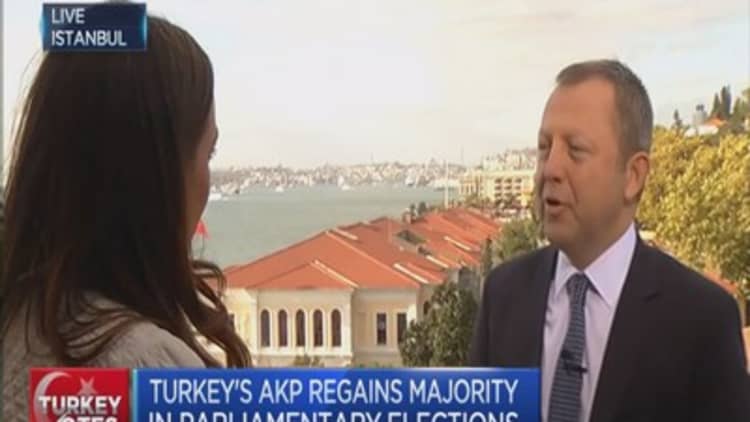The Turkish people have given incumbent President Recep Tayyip Erdogan's AKP (Justice and Development Party) an unexpected majority in the country's second election within five months – but this doesn't mean smooth sailing for the troubled country.
Erdogan has not only proved the value of the maxim "if at first you don't succeed try, try again", but also cemented his position as the most important statesman in Turkey since Kemal Ataturk, the founder of modern Turkey, who died in 1938.
This apparent restoration of stability, which defied polls that forecast a coalition government, helped drive the Turkish lira higher in trading Monday morning. The AKP has fallen just short of an overall majority, which is encouraging some who think it may make them more likely to compromise with other parties.
Yet, many of the problems which caused more voters to back opposition parties in June's elections remain – and here's why investors should be worried.
Economic malaise
Over the course of the Erdogan-led AKP's dominance of politics, Turkey's economy has gone from rising star to falling meteorite. As reform stalled, growth slowed from close to 9 percent at the start of the decade, to a forecast 3.5 percent this year. Markets have punished the country for perceived poor economic governance, with the lira hitting new lows against the dollar this year and global powerhouses like HSBC trying to exit.
"The market will want reassurance in terms of the new economics policy team – (and will be) wanting to see still prominent places for the likes of (Ali) Babacan and (Mehmet) Simsek," Timothy Ash, head of Central Eastern Europe, Middle East & Africa credit strategy for Nomura, wrote in a research note.
"The key weakness of the Turkish economy has been a chronic current account deficit. That takes some serious structural reform efforts," Mahmut Kaya, chief executive of Garanti Asset Management, told CNBC.

The win reduces near-term political uncertainty, but the government still has to battle low growth, high inflation and volatile capital flows, ratings agency Moody's cautioned in a statement Monday.
Turkish banks are still facing "heightened risk aversion", the agency warned.
Presidential power
Of course, with another few years in power, Erdogan may feel that he doesn't need to bother heeding advice – particularly when it comes to his controversial meddling in the affairs of the central bank.
Mere hours after the election result, there already seem to be calls for a referendum on an "executive presidency" for Erdogan, who stepped down as Prime Minister after winning a third term under his party's rules. The presidency with him in charge has already become a more powerful role than its traditional neutral, ceremonial function. Yet all he needs is one of the smaller parties to co-operate to put his increased power to the vote.
Kurdish factor
The pro-Kurdish HDP (Peoples' Democratic Party), while it lost some ground from June, has still secured the 10 percent necessary to ensure it is represented in the country's parliament for the first time.
Erdogan has not exactly been friendly towards Turkey's substantial Kurdish population during his reign – and fear of the civil unrest between government forces and Kurdish fighters in southeast Turkey is likely to have boosted him at the ballot boxes. Yet some hope he will be forced to be more conciliatory as the military conflict looks increasingly unwinnable.
Migrant crisis
Close to 2 million desperate refugees from conflict in the Middle East are believed to have ended up in Turkey, according to the United Nations, with their next stop Europe. With the European powers keen to control migration as well as address the ongoing humanitarian catastrophe which has led to thousands drown in in the Mediterranean this year, the crisis might yet be Erdogan's ticket back in from the international cold.
- By CNBC's Catherine Boyle
Correction: This story has been updated to reflect that Prime Minister Erdogan had to step down after two terms, under the AKP's constitution.




